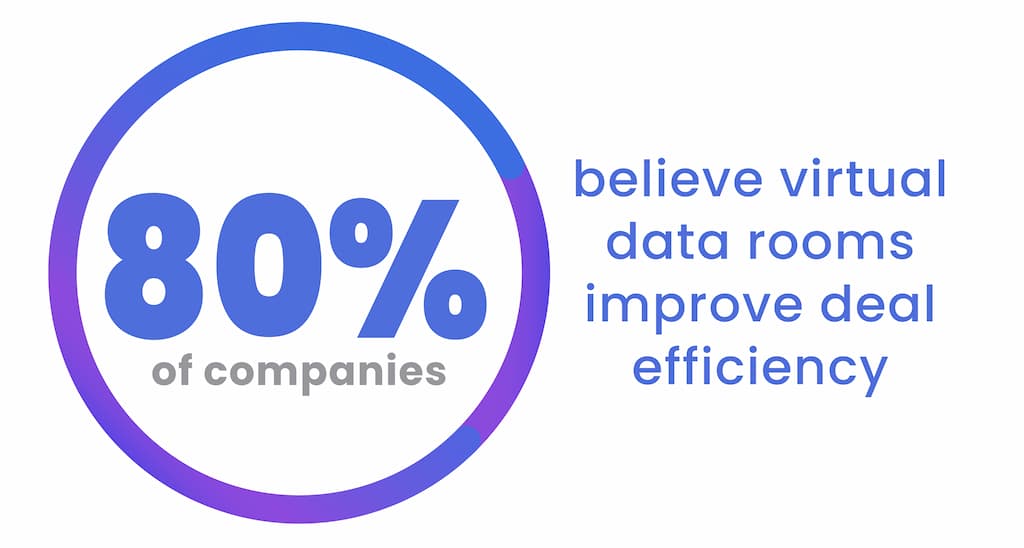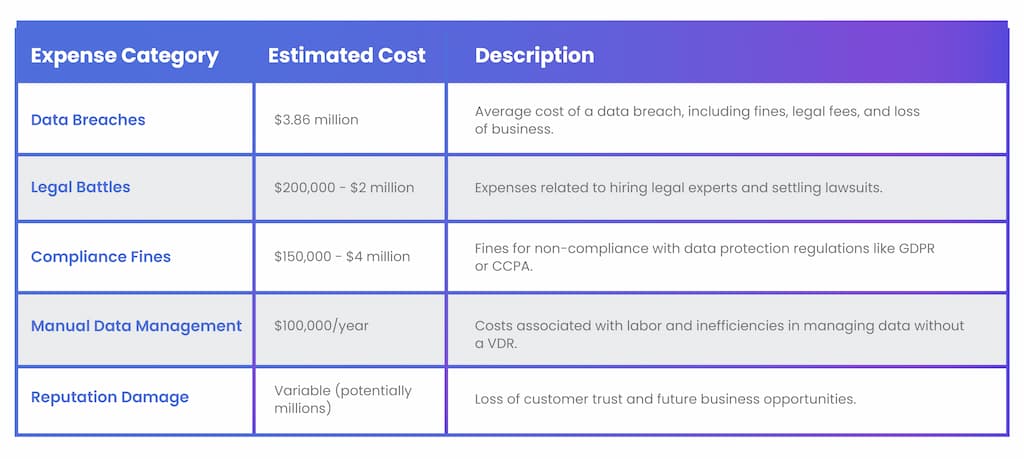
In today’s fast-paced business world, staying ahead of the competition often hinges on efficient, secure communication and collaboration. Enter virtual data room software — a game-changer for enterprises navigating the complexities of business development in a remote working environment. But what makes these digital sanctuaries indispensable?
Not only do VDRs offer a secure space for storing and sharing sensitive documents, but they also provide tools specifically designed to facilitate business growth. Imagine having a secure, organized, and easily accessible digital hub that streamlines everything from due diligence to mergers and acquisitions, all while ensuring that your remote teams stay connected and productive.
How does virtual data room software enhance collaboration in a remote working environment?
Virtual data rooms (VDRs) streamline collaboration by offering a centralized platform where team members can access, share, and manage documents securely. In a remote working environment, where the need for seamless communication and coordination is paramount, VDRs break down geographical barriers and ensure that everyone remains on the same page.
How does virtual data room software enhance collaboration in a remote working environment?
Virtual data rooms (VDRs) streamline collaboration by offering a centralized platform where team members can access, share, and manage documents securely. In a remote working environment, where the need for seamless communication and coordination is paramount, VDRs break down geographical barriers and ensure that everyone remains on the same page.
One of the primary advantages of a VDR is the ability to provide real-time updates and notifications. This means that whenever a document is modified or a new file is uploaded, stakeholders are instantly aware, enhancing transparency and ensuring timely action. Furthermore, advanced permission settings allow administrators to control who can view, edit, or download documents, safeguarding confidential information while facilitating necessary access.
Virtual data rooms can reduce transaction times by up to 40%
Integration with tools like Microsoft Teams further augments collaboration. Teams can utilize features such as shared workspaces, video conferencing, and threaded discussions to discuss documents stored in the VDR, making it easier to brainstorm, problem-solve, and make decisions without having to leave the platform. Additionally, VDRs can be customized to fit the specific needs of a project or team, whether it’s setting up workflows, assigning tasks, or tracking document versions.
VDRs also enhance security through encryption technologies and access control methods that ensure data protection against unauthorized access. This level of security is crucial for organizations dealing with sensitive information, allowing them to comply with regulations and foster trust among clients.
By consolidating documents and communication within a single ecosystem, virtual data rooms not only facilitate smoother collaboration but also save time. Instead of managing multiple emails and disparate file systems, teams have a unified source of truth, driving efficiency and effectiveness in a remote working environment.
What are the key features of virtual data rooms that support remote business development?
Virtual data rooms (VDRs) are indispensable tools in today’s business landscape, particularly as organizations pivot to remote work. Their specialized features cater to the nuanced needs of remote business development, ensuring seamless, secure, and efficient operations.
Firstly, centralized storage is a cornerstone of VDR functionality. With a VDR, your team can store critical documents in a centralized digital repository that’s accessible from any location. This eradicates the inefficiencies linked with dispersed data storage, ensuring that your team has quick access to necessary information whenever required.
Enhanced security is another pivotal feature. VDRs employ advanced encryption technologies and stringent access control mechanisms to safeguard confidential information. This is particularly crucial when handling sensitive business data such as financial records or intellectual property. Knowing that your data is secure allows your team to focus on strategic activities without the lingering fear of data breaches.
90% of data breaches are caused by human error
In terms of collaboration tools, VDRs shine brightly. They facilitate real-time collaboration through features such as document version tracking, annotations, and audit trails. This capability is indispensable for remote teams, enabling them to work synchronously on documents, ensuring that all stakeholders are on the same page.
85% of businesses report improved collaboration with virtual data rooms
Moreover, the integration capabilities of VDRs cannot be overstated. Leading solutions, such as those integrated with Microsoft Teams, allow seamless connectivity with other essential tools and applications. This interoperability fosters a more cohesive working environment, combining the strengths of various platforms to augment productivity and coherence.
VDRs also offer remarkable customization options. You can tailor the user interface, access settings, and notification preferences to align with specific business needs. This flexibility ensures that the VDR supports your workflow rather than imposing a rigid structure.
Finally, accessibility is a vital element. Whether you’re at your home office, traveling, or at a client’s site, VDRs ensure you have uninterrupted access to essential documents and data. This continuous accessibility is indispensable for maintaining the momentum of business development activities, regardless of geographical or temporal constraints.
What are the cost benefits of using virtual data room software for remote teams?
VDRs significantly reduce the need for physical office spaces and infrastructure. As remote teams no longer require physical storage rooms filled with documents, companies can save substantially on real estate and associated overhead costs such as utilities and maintenance. This cost efficiency becomes even more pertinent when a business spans multiple locations worldwide.
Moreover, the digital nature of VDRs streamlines the document management process, eliminating the expenses related to printing, copying, and shipping documents. These traditional methods not only incur direct financial costs but also lead to time delays, especially in time-sensitive business environments like mergers and acquisitions or legal proceedings. With VDRs, documents can be accessed and shared instantaneously, regardless of geographical boundaries, enhancing both cost efficiency and operational agility.
Additionally, VDRs are designed with robust security features, reducing the risk of data breaches that can lead to costly legal battles and damage to the company’s reputation. The secure sharing capabilities and detailed access logs support compliance with data protection regulations, thereby avoiding potential fines and further financial liabilities. The investment in VDR technology thus acts as a preventive measure against such risks, providing long-term financial stability.
Virtual data room software is scalable to suit the size and needs of any organization. This scalability means companies only pay for the storage and features they require, offering a flexible pricing model compared to traditional file storage solutions that may require substantial up-front investments irrespective of actual usage. VDRs can accommodate growing business needs without unnecessary costs, making them a cost-effective choice for dynamic and expanding remote teams.
Lastly, integrating VDRs with existing platforms like Microsoft Teams or other business ecosystems ensures a cohesive and productive working environment. By leveraging these integrations, companies can reduce the costs associated with switching between disparate systems and training employees on multiple platforms. The seamless experience bolsters productivity, leading to further cost savings through enhanced efficiency and reduced downtime.
In summation, the cost benefits of virtual data rooms for remote teams span from reduced physical storage needs and operational costs to enhanced security and scalability. These advantages collectively contribute to a more streamlined, cost-effective, and secure remote working environment, positioning VDRs as a crucial tool in modern business development.
What industries benefit most from using virtual data room software for remote work?
Virtual data rooms (VDRs) are transforming how industries operate, especially with the growing need for remote work solutions. Several sectors stand out as prime beneficiaries.
Mergers and Acquisitions (M&A): In M&A processes, vast amounts of sensitive information must be exchanged between parties. VDRs provide a secure and streamlined platform, enabling efficient due diligence and transparent communication, crucial for closing deals remotely.
Legal Industry: Law firms and legal departments manage confidential documents such as contracts, case files, and client information. VDRs ensure that these sensitive materials are stored securely and accessed only by authorized personnel, significantly reducing the risk of data breaches.
Private Equity and Venture Capital: These sectors are heavily involved in financial transactions that require rigorous due diligence. VDRs facilitate seamless and secure document sharing among investors, portfolio companies, and advisors, enhancing decision-making processes and fostering investor confidence.
Healthcare: The healthcare industry relies on VDRs for managing clinical trials, patient records, and other critical confidential data. VDRs not only provide enhanced security compliance but also streamline collaboration among researchers, medical professionals, and regulatory bodies.
Real Estate: Real estate transactions involve significant documentation, including property deeds, inspection reports, and financial agreements. VDRs simplify the management and sharing of these documents, expediting the transaction process and ensuring confidentiality.
Industries such as finance, biotechnology, and manufacturing also stand to benefit significantly from VDRs. By providing a secure, organized, and easily accessible platform for document management, VDRs are helping these sectors navigate the challenges of remote work efficiently.
Additionally, commercial real estate and oil and gas industries are tapping into the advantages of VDRs. For commercial real estate, virtual data rooms streamline property evaluations, tenant information management, and transaction processes.
In the oil and gas sector, they facilitate the secure exchange of seismic data, project plans, and contracts, ensuring that all stakeholders have access to critical information while maintaining robust security protocols.
Choosing the right virtual data room software for Your remote business needs
When evaluating differentvirtual data room software solutions, it’s crucial to consider the specific needs and workflows of your remote team. Platforms like Dealroom and iDeals offer robust features, but if you’re looking for a solution particularly well-suited for collaborative projects, ShareVault is worth a closer look.
ShareVault stands out for its user-friendly interface, advanced security protocols, and seamless integration capabilities. It facilitates real-time collaboration, making it easier to share sensitive documents securely. This platform excels in providing granularaccess controls, ensuring that only authorized personnel can view or edit specific parts of your documents.
ShareVault’s diligent focus on compliance and its flexible deployment options make it a reliable choice for various industries, from healthcare to legal sectors. By investing in the right virtual data room, you can streamline business development activities, enhancing productivity and trust within your remote team.











